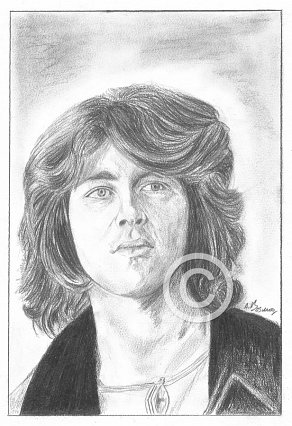Mick Taylor
Pencil Portrait by Antonio Bosano.

Shopping Basket
The quality of the prints are at a much higher level compared to the image shown on the left.
Order
A3 Pencil Print-Price £45.00-Purchase
A4 Pencil Print-Price £30.00-Purchase
*Limited edition run of 250 prints only*
All Pencil Prints are printed on the finest Bockingford Somerset Velvet 255 gsm paper.
P&P is not included in the above prices.



Comments
Here’s Mick Taylor back in 1969, the fresh faced virtuoso blues guitarist newly recruited by the Rolling Stones as the replacement for Brian Jones.
Five years younger than his bandmates, and an infinitely more gifted instrumentalist as a result of three years touring with the influential John Mayall and the Bluesbreakers, he would endure five years of professional frustration and to some degree, personal responsibility for his descent into drug addiction.
Yet there’s an imperceptibly dark undertone to life inside the Stones’ inner sanctum that will chew up individuals bereft of the constitution of an ox, and spit them out again. For some who have the caught the coattails of this 50 year plus rock’n‘roll odyssey, survival at any cost has been the order of the day.
‘People are always asking me whether I regret leaving the Rolling Stones,’ he says these days. ‘I make no bones about it – had I remained with the band, I would probably be dead. I was having difficulties with drug addiction and couldn’t have lasted. But I’m clean now and have been for years.
‘My life is so much better now than being a drug-ravaged member of the Stones. So no, I don’t regret leaving. ‘But people who really know me ask another question – whether I regret joining the Stones. To me, that’s far more astute.’
Bereft of royalty payments for his key contribution to the Stones’ sound since 1982 (eight years after he had left the band), Taylor, like bassist Bill Wyman, continues to pay the financial price for his temerity. As Keith Richards once wryly observed; ‘Nobody leaves this band except in a coffin’. Taylor obviously hadn’t read the script, yet his sublime playing still resonates with his ex-bandmates.
‘I was in awe sometimes listening to Mick Taylor’, Richards wrote in his 2010 memoir, ‘Everything was there in his playing – the melodic touch, a beautiful sustain and a way of reading a song’.
His impact, on masterworks such as ‘Exile on Main Street’ and ‘Sticky Fingers’, was immediate. The down-and-dirty slide on ‘Love in Vain’; the jaw-dropping precision on ‘All Down the Line’ where his playing brilliantly mimics the sound of a harmonic); the extended, Latin-jazz-inflected coda on ‘Can’t You Hear Me Knocking’ – it’s no accident that Taylor’s stint coincided with the Stones’ most consistently great recordings.
‘He was a very fluent, melodic player… and it gave me something to follow, to bang off’, Mick Jagger said of Taylor, who left the band in 1974. ‘Some people think that’s the best version of the band that existed’.